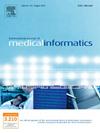Developing an AI-Based clinical decision support system for basal insulin titration in type 2 diabetes in primary Care: A Mixed-Methods evaluation using heuristic Analysis, user Feedback, and eye tracking
IF 3.7
2区 医学
Q2 COMPUTER SCIENCE, INFORMATION SYSTEMS
International Journal of Medical Informatics
Pub Date : 2024-12-31
DOI:10.1016/j.ijmedinf.2024.105783
引用次数: 0
Abstract
Background and aim
The progressive nature of type 2 diabetes often, in time, necessitates basal insulin therapy to achieve glycemic targets. However, despite standardized titration algorithms, many people remain poorly controlled after initiating insulin therapy, leading to suboptimal glycemic control and complications. Both healthcare professionals and people with type 2 diabetes have expressed the need for novel tools to aid in this process. Traditional titration methods often lack the precision needed to address individual differences in glycemic response. Recent studies have highlighted the potential of AI-driven solutions, which can leverage large datasets to model patient-specific characteristics. Therefore, this study aims to develop a digital platform for an AI-based clinical decision support system to assist healthcare professionals in primary care with personalized and optimal basal insulin titration for people with type 2 diabetes.
Methods
An iterative mixed-method approach was used for system development, incorporating usability engineering principles. Initial requirements were gathered from domain experts and followed by heuristic evaluation and user-based evaluation. Data from these evaluations guided successive iterations of the prototype.
Results
The initial prototype featured a retrospective graph of insulin doses and fasting glucose levels and a dose adjustment simulation environment. Heuristic evaluation identified 92 issues, primarily related to minimalistic and aesthetic design. The second prototype addressed these concerns, but user-based evaluation found 66 additional usability problems, notably with HbA1c presentation and the need for more glucose measures. The final prototype showed high usability, with a median System Usability Scale score of 93.8. Task completion rates were high (task 1: 87.5%, task 2: 75.0%, and task 3: 100%). Eye-tracking data showed minimal distractions.
Conclusions
The AI-based Clinical Decision Support System shows promise in managing basal insulin titration for people with type 2 diabetes, addressing clinical inertia, and providing a user-friendly, efficient tool to improve glycemic control during insulin titration.
开发基于人工智能的2型糖尿病初级保健基础胰岛素滴定临床决策支持系统:使用启发式分析、用户反馈和眼动追踪的混合方法评估。
背景与目的:2型糖尿病的进行性往往需要基础胰岛素治疗来达到血糖目标。然而,尽管有标准化的滴定算法,许多人在开始胰岛素治疗后仍然控制不佳,导致血糖控制不佳和并发症。医疗保健专业人员和2型糖尿病患者都表示需要新的工具来帮助这一过程。传统的滴定方法往往缺乏解决血糖反应个体差异所需的精确性。最近的研究强调了人工智能驱动的解决方案的潜力,它可以利用大型数据集来模拟患者的特定特征。因此,本研究旨在为基于人工智能的临床决策支持系统开发一个数字平台,以帮助医疗保健专业人员在初级保健中为2型糖尿病患者提供个性化和最佳的基础胰岛素滴定。方法:结合可用性工程原理,采用迭代混合方法进行系统开发。从领域专家那里收集初始需求,然后进行启发式评估和基于用户的评估。来自这些评估的数据指导了原型的连续迭代。结果:最初的原型具有胰岛素剂量和空腹血糖水平的回顾性图表和剂量调整模拟环境。启发式评估确定了92个问题,主要与极简主义和美学设计有关。第二个原型解决了这些问题,但基于用户的评估发现了66个额外的可用性问题,特别是糖化血红蛋白的显示和需要更多的葡萄糖测量。最终的原型显示出很高的可用性,系统可用性量表得分中位数为93.8。任务完成率高(任务1:87.5%,任务2:75.0%,任务3:100%)。眼动追踪数据显示干扰最小。结论:基于人工智能的临床决策支持系统有望管理2型糖尿病患者的基础胰岛素滴定,解决临床惯性,并提供一种用户友好,有效的工具来改善胰岛素滴定过程中的血糖控制。
本文章由计算机程序翻译,如有差异,请以英文原文为准。
求助全文
约1分钟内获得全文
求助全文
来源期刊

International Journal of Medical Informatics
医学-计算机:信息系统
CiteScore
8.90
自引率
4.10%
发文量
217
审稿时长
42 days
期刊介绍:
International Journal of Medical Informatics provides an international medium for dissemination of original results and interpretative reviews concerning the field of medical informatics. The Journal emphasizes the evaluation of systems in healthcare settings.
The scope of journal covers:
Information systems, including national or international registration systems, hospital information systems, departmental and/or physician''s office systems, document handling systems, electronic medical record systems, standardization, systems integration etc.;
Computer-aided medical decision support systems using heuristic, algorithmic and/or statistical methods as exemplified in decision theory, protocol development, artificial intelligence, etc.
Educational computer based programs pertaining to medical informatics or medicine in general;
Organizational, economic, social, clinical impact, ethical and cost-benefit aspects of IT applications in health care.
 求助内容:
求助内容: 应助结果提醒方式:
应助结果提醒方式:


